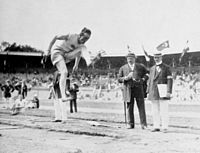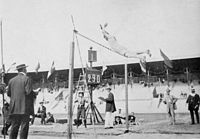
The Summer Olympic Games, also known as the Summer Olympics or the Games of the Olympiad, is a major international multi-sport event normally held once every four years. The inaugural Games took place in 1896 in Athens, Greece, and the most recent was held in 2024 in Paris, France. This was the first international multi-sport event of its kind, organized by the International Olympic Committee (IOC) founded by Pierre de Coubertin. The tradition of awarding medals began in 1904; in each Olympic event, gold medals are awarded for first place, silver medals for second place, and bronze medals for third place. The Winter Olympic Games were created out of the success of the Summer Olympic Games, which are regarded as the largest and most prestigious multi-sport international event in the world.

The decathlon is a combined event in athletics consisting of 10 track and field events. The word "decathlon" was formed, in analogy to the word "pentathlon", from Greek δέκα and ἄθλος. Events are held over two consecutive days and the winners are determined by the combined performance in all. Performance is judged on a points system in each event, not by the position achieved. The decathlon is contested mainly by male athletes, while female athletes typically compete in the heptathlon.
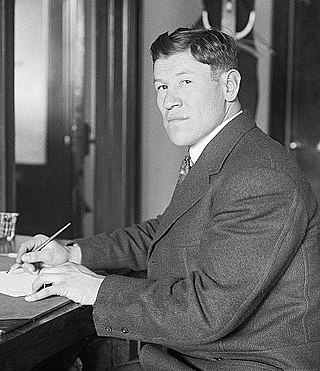
James Francis Thorpe was an American athlete and Olympic gold medalist. A member of the Sac and Fox Nation, Thorpe was the first Native American to win a gold medal for the United States in the Olympics. Considered one of the most versatile athletes of modern sports, he won two Olympic gold medals in the 1912 Summer Olympics. He also played football, professional baseball, and professional basketball.

The 1912 Summer Olympics, officially known as the Games of the V Olympiad and commonly known as Stockholm 1912, were an international multi-sport event held in Stockholm, Sweden, between 6 July and 22 July 1912. The opening ceremony was held on 6 July.

Avery Brundage was the fifth president of the International Olympic Committee, serving from 1952 to 1972, the only American and only non-European to attain that position. Brundage is remembered as a zealous advocate of amateurism and for his involvement with the 1936 and 1972 Summer Olympics, both held in Germany.
The 1912 Summer Olympics, officially known as the Games of the V Olympiad, were an international multi-sport event held in Stockholm, Sweden, between 5 May and 27 July 1912. Twenty-eight nations and 2,408 competitors, including 48 women, competed in 102 events in 14 sports.

Baseball had its first appearance at the 1912 Summer Olympics as a demonstration sport. It would become an official sport 70 years later at the 1992 Summer Olympics. A game was played between the United States, the nation where the game was developed, and Sweden, the host nation. The game was held on Monday, 15 July 1912 and started at 10 a.m. on the Ostermalm Athletic Grounds in Stockholm; the U.S team won after six innings.

These are the results of athletics competition at the 1912 Summer Olympics. 30 events were contested, all for men only.
Gustaf "Gösta" Richard Mikael Holmér was a Swedish athlete who competed in the 1912 and 1920 Olympics. In 1912 he won a bronze medal in the decathlon and placed eighth in the pentathlon, despite not running the 1500 m stage. In 1920, he placed fourth in the decathlon and was eliminated in the first round of the 110 m hurdles event. Nationally, Holmér won Swedish titles in the pentathlon, decathlon and 110 m hurdles (1913).
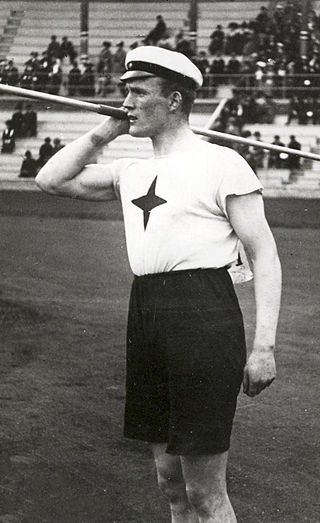
Karl Hugo Wieslander was a Swedish athlete. He set the inaugural world record in the pentathlon in Gothenburg in 1911 with a score of 5516 points. The following year, he finished second in the decathlon at the 1912 Summer Olympics in Stockholm, 688 points behind Jim Thorpe. In 1913, after it was discovered that Thorpe had played semi-professional baseball for a minor league team, Thorpe was disqualified for not being an amateur. Wieslander was declared the winner of the 1912 Olympics event and awarded the gold medal, which he refused to accept. In 1982, Thorpe was reinstated by the IOC with Hugo Wieslander as joint winners of the 1912 Olympic decathlon. The IOC announced 15 July 2022 that Thorpe's gold medal had been reinstated and Wieslander, whose family had considered Thorpe the rightful winner, became the silver medalist.
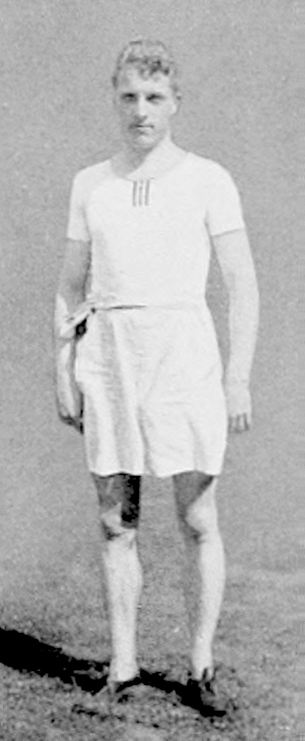
Ferdinand Reinhardt Bie was a Norwegian track and field athlete. At the 1912 Summer Olympics in Stockholm, he won the silver medal in pentathlon. On winner Jim Thorpe's subsequent disqualification for having played semi-professional baseball in 1913, Bie was declared Olympic champion, but refused to accept the gold medal from the IOC. In 1982 Thorpe was reinstated as champion by the IOC; however, Bie was still listed as co-champion until the IOC announced 15 July 2022 that Thorpe's gold medal had been reinstated and Bie became the silver medalist.

Sweden was the host nation for the 1912 Summer Olympics in Stockholm. 444 competitors, 421 men and 23 women, took part in 95 events in 16 sports.

The Russian Empire (Russia) competed at the 1912 Summer Olympics in Stockholm, Sweden. 159 competitors took part in 62 events in 15 sports.

Norway competed at the 1912 Summer Olympics in Stockholm, Sweden. 190 competitors, 188 men and 2 women, took part in 58 events in 14 sports.

Germany competed at the 1912 Summer Olympics in Stockholm, Sweden. 185 competitors, 180 men and 5 women, took part in 69 events in 14 sports. Due to the political fallout from World War I, this was the country's last appearance until 1928.

The men's high jump, also known as the running high jump to distinguish it from the standing high jump, was a track and field athletics event held as part of the Athletics at the 1912 Summer Olympics programme. It was the fifth appearance of the event, which is one of 12 to have been held at every Summer Olympics. The competition was held on July 7, 1912, and on July 8, 1912. Thirty-seven high jumpers from ten nations competed. NOCs could enter up to 12 athletes. The event was won by Alma Richards of the United States, the nation's fifth consecutive victory in the men's high jump. Germany won its second silver medal in the event, after 1904.

The men's shot put was a track and field athletics event held as part of the athletics at the 1912 Summer Olympics programme. The competition was held on Wednesday, July 10, 1912. Twenty-two shot putters from 14 nations competed. NOCs could enter up to 12 athletes. The event was won by Pat McDonald of the United States, the nation's fifth consecutive victory in the men's shot put. The American team swept the top three places, the third time in five Games. Ralph Rose took silver, 9 centimetres shy of a third gold medal; he became the first man to win three medals of any color.

The men's discus throw was a track and field athletics event held as part of the athletics at the 1912 Summer Olympics programme. The competition was held on Friday, July 12, 1912. Forty-one discus throwers from 15 nation competed. NOCs could enter up to 12 athletes. The event was won by Armas Taipale of Finland, the nation's first medal in the men's discus throw. Richard Byrd took silver and James Duncan took bronze to continue the United States' podium streak at five consecutive Games.
The men's pentathlon was a track and field athletics event held as part of the Athletics at the 1912 Summer Olympics programme. It was the first time the event was held. Twenty-six athletes from 11 nations competed. NOCs could enter up to 12 athletes. Jim Thorpe's gold medal was the first ever won by an Indigenous American athlete in Olympic history.

Combined events at the Summer Olympics have been contested in several formats at the multi-sport event. There are two combined track and field events in the current Olympic athletics programme: a men's decathlon and a women's heptathlon.

